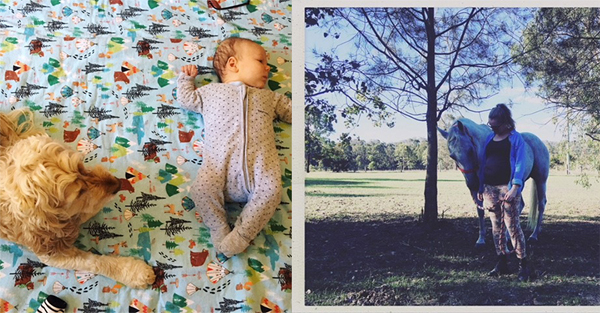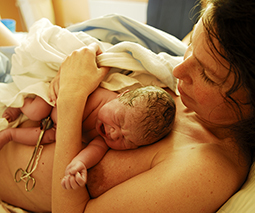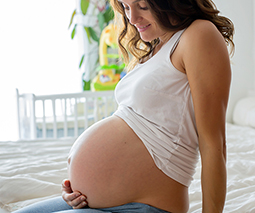Why your pet freaks out at the first whiff of pregnancy

Ever noticed how animals, especially your pets, take a keen interest in your pregnancy? Often before you even know there’s a baby coming?
According to researchers at Animal Planet, pregnancy hormones change a person’s smell and that accounts for a change in the behaviour of our pets and animals because they use smell to detect familiarity. They may also pick up on a change in your mobility, shape and gait and sense the need to protect you.
How sweet is that?
Pooch versus horse
When mum of one, Mel, fell pregnant she had a pet cocker spaniel, Frankie and a pet horse, Stormy.

Mel said Frankie, who she and her partner had had for three years, turned “sooky” right away.
“She got sooky, but she’s sooky anyway. She loves cuddles and she did lots of sniffing early on,” says Mel.
“When we brought our son Noah home, she was really confused, but still interested in him. But she did get super possessive of my mum, Noah’s grandma, because they’d always shared a special bond and now she had to share her!”
“He acted differently straight away”
But Mel’s horse Stormy had a very different reaction to her pregnancy.
“I’d see him three times a week and I swear he knew before we did. He acted differently straight away,” says Mel.
“All of a sudden when he saw me, he’d get all jumpy and agitated. My parents warned me not to go near him … Towards the end he was fine, it was just during the early stages. I think it was my smell too that threw him off.”
How to prepare your pet for baby’s arrival
According to the RSPCA, pets need just as much preparation time for the arrival of a baby as you do! So the more planning you can set in motion before you bring baby home the better.
Here are some of their top tips to help you do exactly that.
1. Evaluate existing routines
Consider where your pet will sleep and eat. Is it necessary to change all routines? Where will I feed my baby when they start solids and is it near where the pet eats? And if you plan on changing anything, make sure you do so well in advance, prior to the arrival of the baby.
2. Meet your pet’s needs
Things can get hectic with a new baby at home but that doesn’t mean you can neglect your pet’s needs either. Make sure you have someone who can walk, feed and spend time with your pet when your baby is born.
3. Understand your pet’s behaviour
Does your pet like kids? How do they react to new things or situations? Do they bark a lot and how will this affect your baby? Understanding your pet’s behavioural needs allows you to adequately meet them.
4. How to prepare your pets
Familiarise your pet with new items in the house such as prams, cots and musical toys. Allow your pet to investigate these items and create positive associations with them. Utilise technology such as the ‘Sound proof puppy training‘ app or YouTube to expose your pets to the new noises they may encounter once the new addition comes home. Bringing a blanket from the hospital for your pet to smell can also help familiarise them with the smells of the baby.
5. How to introduce your pet to your new baby
When bringing your baby home, have another family member to carry the baby, as this allows you to greet your pet in a calm, stress-free manner, as usual. Once you are ready to introduce your new baby, allow your pet to calmly sit beside you or on their mat. Ensure you allow pets to smell the baby’s feet first and keep an eye on the pet’s body language. If you are worried about excitable behaviour from the dog you can use preventative measures such as ensuring the dog stays on the lead.
6. Create a peaceful ‘time out’ space for your pet at home
Set aside a peaceful place for your pet once baby arrives home. This will help you maintain a regular routine for them, and avoid any ‘competitive behaviour’, allowing them to adjust to new changes and remember to ensure any interactions are fun and positive for both the dog and baby.













